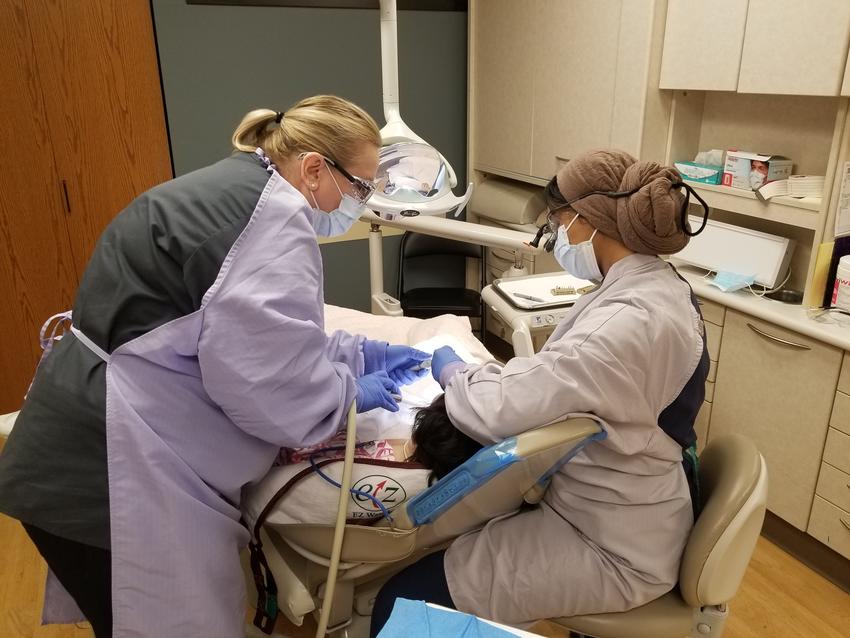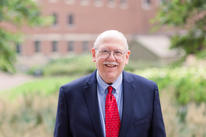Minnesota group leads effort in dementia-friendly oral health care

An epidemic of dementia is upon the United States—and a group featuring School of Dentistry expert Stephen Shuman, DDS, MS, director of the Oral Health Services for Older Adults program, is doing what they can to make sure health care settings are ready.
“The number of adults with dementia in our communities is rapidly growing,” Shuman explained, noting that more than 6.5 million people are affected in the United States, with more than 100,000 in Minnesota. More strikingly, he pointed out that those numbers are expected to triple by 2050.
Dementia is a real and growing problem, and representatives of the Minnesota Area Agencies on Aging and the Minnesota Dental Association wanted to make sure oral health providers and communities are prepared to provide care for those affected, both patients and care partners. “As Chair of the MDA’s Barriers to Care Committee, I considered this a great opportunity for us to help dental professionals better serve the needs of their communities,” Shuman explained of the initial push to become part of the Dementia-Friendly Communities initiative in 2019. “It also fit well with my expertise here at the School of Dentistry and the goals of our Minnesota Northstar Geriatrics Workforce Enhancement Program (GWEP).” The collaboration is funded in part by the Delta Dental of Minnesota Foundation and the FR Bigelow Foundation through grants to Trellis (formerly the Metropolitan Area Agency on Aging), along with the University’s Northstar GWEP funded by the US Health Resources and Services Administration.
Through those meetings and that partnership came the idea to better equip providers and offices to care for patients with dementia by modifying and supplementing existing Dementia-Friendly Communities resources and producing a package of educational materials for dental teams called “Dementia-Friendly Dental Practices.” The package features a program with components suitable for the entire dental team, including administrative staff, “Dementia-Friendly @ Work for Healthcare,” as well as a program specifically for clinical dental care providers, called “Dementia-Friendly Dental Practices Advanced Training.”
Citing the growing population of people with dementia, Shuman noted, “the question is whether dental practices are ready to face the challenges that dental care can bring, since this will be one of the most common chronic conditions seen in dental offices.” To help answer that question, Dementia-Friendly Dental Practices prepares practices to recognize signs of dementia, provide a safe and supportive environment, address ethical and legal issues, provide appropriate treatment planning and procedural modifications, and ensure a positive experience for patients and their care partners.
“The challenges of dementia care will be with us for some time,” Shuman reflected, “so our profession has to be prepared.”
Over the past several months, Shuman and his colleagues have piloted the Dementia-Friendly @ Work for Healthcare basic training, designed for all dental staff, and components of the more intensive advanced training for clinical staff. Those pilots allow providers to receive the training while helping Shuman and his colleagues ensure the training is ready for a wider audience.
Carissa Knutson, DDS ’99, is a dentist at Southill Dental Group in Stillwater, the first practice to receive the Dementia-Friendly @ Work for Healthcare training. After 23 years in practice, Knutson decided to participate in the program because “we continue to see an increase in the number of individuals affected by Alzheimer’s disease and other forms of dementia,” and she “believed it would be a wonderful opportunity for our team to learn and better serve our community.”
Knutson and her team found the training to be an excellent team-building opportunity and appreciated the opportunity to practice and discuss how to manage patient care. “The training provided an excellent overview of identifying warning signs of dementia, strategies for communicating and interacting with patients and ways to improve patient safety and wellbeing in the office,” she said.
She was surprised to learn that 10% of people above age 65 and ⅓ of people over age 85 have Alzheimer’s disease. “That means, statistically, we are treating a lot of patients with Alzheimer’s!” she noted.
Knutson, whose mother-in-law was recently diagnosed with fronto-temporal dementia, found the training particularly meaningful and impactful. “Having experience with a loved one diagnosed with dementia, I have witnessed the importance of continuing to treat these individuals with dignity and respect, to slow down and to remember that patience and support go a long way.”
She reported that her office has already implemented improved strategies and processes for communication, and has even made changes to the office to ensure safety. “Having knowledge of this disease and how we can better communicate and care for patients with dementia helps us to be better healthcare providers,” she said.
That is exactly what Shuman hopes the training will provide as it rolls out to more dental offices throughout this year.
“I hope we can create a network of dementia-friendly dental practices throughout Minnesota and even the US, so that patients with dementia and their care partners can more easily find the oral health care they need and deserve on a regular basis, rather than waiting until problems arise,” he said. “I’m hopeful that making it easier to receive the care needed on a timely basis and improving oral health in this population will help us avoid having to put patients through the extensive and stressful treatment we now see too often.”
Learn more about the Minnesota Northstar Geriatric Workforce Enhancement Program, a key partner in Dementia-Friendly Dental Practices. If you lead a clinic, see the Dementia-Friendly @ Work for Healthcare training website.
